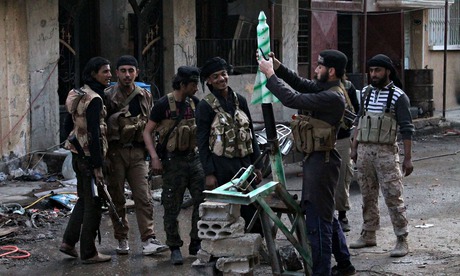
The Greek philosopher Aristotle believed that the universe had existed for ever. The reason humanity was not more developed, he believed, was that floods or other natural disasters repeatedly set civilisation back to the beginning.
Today, humans are developing ever faster. Our knowledge is growing exponentially and, with it, our technology. But humans still have the instincts, and in particular the aggressive impulses, that we had in caveman days. Aggression has had definite advantages for survival, but when modern technology meets ancient aggression the entire human race and much of the rest of life on Earth is at risk.
Today in Syria we see modern technology in the form of bombs, chemicals and other weapons being used to further so-called intelligent political ends. But it does not feel intelligent to watch as more than 100,000 people are killed or while children are targeted. It feels downright stupid, and worse, to prevent humanitarian supplies from reaching clinics where, as Save the Children will document in a forthcoming report, children are having limbs amputated for lack of basic facilities, and newborn babies are dying in incubators for lack of power.
What's happening in Syria is an abomination, one that the world is watching coldly from a distance. Where is our emotional intelligence, our sense of collective justice?
When I discuss intelligent life in the universe, I take this to include the human race, even though much of its behaviour throughout history appears not to have been calculated to aid the survival of the species. And while it is not clear that, unlike aggression, intelligence has any long-term survival value, our very human brand of intelligence denotes an ability to reason and plan for not only our own but also our collective futures.
We must work together to end this war and to protect the children of Syria. The international community has watched from the sidelines for three years as this conflict rages, engulfing all hope. As a father and grandfather I watch the suffering of Syria's children and must now say: no more.
I often wonder what we must look like to other beings watching from deep space. As we look out at the universe, we are looking back in time, because light leaving distant objects reaches us much, much later. What does the light emitting from Earth today show? When people see our past, will we be proud of what they are shown – how we, as brothers, treat each other? How we allow our brothers to treat our children?
We now know that Aristotle was wrong: the universe has not existed for ever. It began about 14bn years ago. But he was right that great disasters represent major steps backward for civilisation. The war in Syria may not represent the end of humanity, but every injustice committed is a chip in the facade of what holds us together. The universal principle of justice may not be rooted in physics but it is no less fundamental to our existence. For without it, before long, human beings will surely cease to exist.
• A version of this article appeared in the Washington Post

